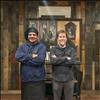Ben there, done Than
How John Calvin initiated the Swiss watchmaking industry
Hey savvy news reader! Thanks for choosing local.
You are now reading
1 of 3 free articles.
I moved to Switzerland earlier this year from Polson, and I’ve been somewhat captivated by the fascinating and long history of Europe. Many incredibly consequential and cascading events have been packed into this relativity small continent, across the millennia. While chatting with a friend and fellow history buff, he mentioned how watchmaking didn’t originate in Switzerland. This piqued my interest and led me down a research rabbit hole to this amazing story.
Switzerland is well known for outstanding chocolate, famous cheeses and luxury watches. For centuries, this little mountainous nation has cultivated a reputation for crafting some of the best mechanical timepieces in the world. With such acclaim, you would be forgiven for assuming this craft originated here, but the story is not that simple.
Like numerous events in the 16th century, the upheaval caused by the Protestant reformation played a large role in this story. During this uproar the French monarchy, which remained Catholic, went to significant lengths to prevent any kind of Protestant foothold from establishing in France. The result was widespread persecution of the French Protestants, also known as the Huguenots. An estimated 10 percent of the French, or roughly 1 million people, had converted to Protestantism. Right across the border in Switzerland, conditions were more forgiving.
Unlike many of the nations in Europe at the time, Switzerland was, to a degree, friendly to both streams of Christianity. The unique structure of the Swiss confederation meant that each Canton was free to choose which side of the Christian faith was accepted in their area. The western part of Switzerland welcomed thousands upon thousands of persecuted French Huguenots. With a common language, it was very easy for these fleeing French to integrate with the Swiss culture.
The French refugees brought the watchmaking trade with them. This exodus coincided with a unique situation for the city of Geneva. Geneva lies right on the Swiss-French border, and it was historically home to a robust jewelry manufacturing industry. John Calvin was the famous reformer who took up residence in Geneva. A major part of Calvin’s reforms strongly encouraged austerity and piousness. François-Marie Arouet, writing under his pen name Voltaire, said of this time: “If they condemned celibacy in the priests, and opened the gates of the convents, it was only to turn all society into a convent. Shows and entertainments were expressly forbidden by their religion; and for more than 200 years, there was not a single musical instrument allowed in the city of Geneva. They condemned auricular confession, but they enjoined a public one; and in Switzerland, Scotland and Geneva, it was performed the same as penance.”
Eventually, Calvin passed an outright ban on wearing jewelry. This abrupt change in the cultural landscape decimated the robust jewelry industry almost overnight. Suddenly, what was once a good livelihood involving skilled artisans and tradesmen went up in smoke; however, these skilled craftsmen soon found another outlet for their talents. They started working with the newly arrived Huguenot watchmakers.
A new dynamic Swiss watchmaking industry flourished with the technical expertise of the Huguenots and traditional jewelry arts. This lead to the creation of watches that were both technically superb and stunning works of art. Eventually, the Swiss watchmakers began to export watches around the world, and for several centuries, they built a reputation for producing some of the best watches in the world. Swiss watchmakers even surpassed both the Dutch and French who were the early masters of this craft. The stage was set for one of the most famous watch companies to relocate. After World War I, taxation skyrocketed in England. Wanting to avoid this heavy tax burden, the renowned British watchmaker Rolex moved its headquarters and production to the one place in the world with an existing industry and a pre-trained workforce: Geneva, Switzerland. The company has resided there ever since.
The art of mechanical watchmaking has moved from functional items into the realm of luxury goods. It is still alive and well. Rolex alone still produces roughly 800,000 timepieces every year.















